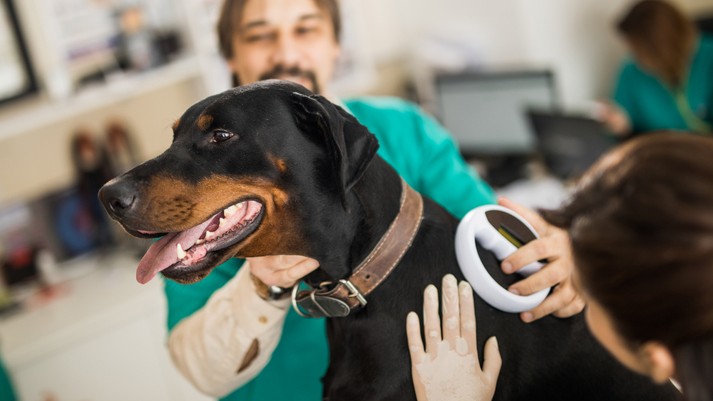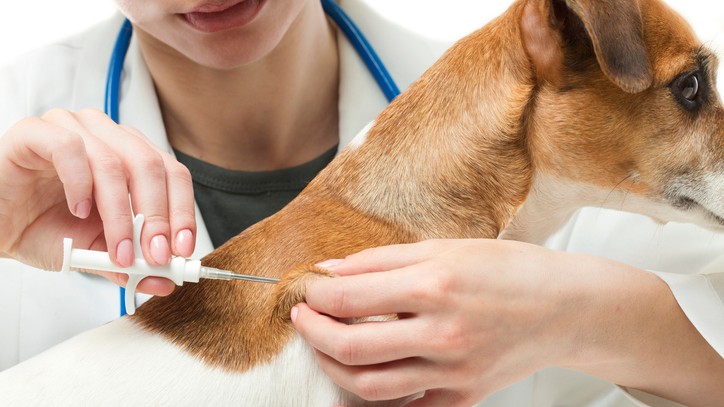Seven reasons to get your dog microchipped
Is your dog microchipped? This quick and easy identification could save your dog’s life one day

Getting your dog microchipped is one of the best ways to keep your dog safe. A microchip is a small radio frequency identification (RFID) transponder about the size of a grain of rice. When scanned with a compatible scanner, it transmits a unique ID code that can be used to look up your pet’s information in the microchip registry.
This significantly increases the chances of your dog being returned to you if he ever becomes lost. In one notable study, microchipped dogs arriving at animal shelters were 2.4 times more likely to be returned to their owners than dogs without microchips.
If you haven’t had your dog microchipped yet, here are a few reasons why it’s a good idea to get it done.
- How to get cheaper pet insurance: Lower insurance costs for all of your pets
- Seven reasons to get your pet insured with the best policy possible – a vet’s view
1. A microchip provides permanent identification for your dog
Sometimes tags fall off or collars go missing. Sometimes accidents happen and your dog gets lost without any identification. There have even been reports of thieves stealing dogs and using dye to hide any unique markings that may help an owner identify their missing dog.
A microchip is the best way to ensure your dog carries identification with them everywhere they go. Because the microchip is implanted under your dog’s skin, it can’t be lost or easily removed.
Shelters, veterinary hospitals, and animal control officers all carry microchip scanners and are trained to scan any stray dog on intake. If a microchip is found, your dog can be returned to you quickly.
2. A microchip is the best way to get a lost pet returned to you
It is estimated that one family pet in three ends up getting lost at some point. And when a pet enters an animal shelter without identification, the likelihood of being returned to their original owner is slim.
The usual methods of searching for a lost dog, such as posting flyers or spreading the word on social media, only work if they are seen by the person who finds your dog. With a microchip, your dog carries a unique identification number with him everywhere they go.
Dogs are always scanned upon arrival at an animal shelter so as long as your contact information is up-to-date in the registry, you’ll get a call soon after your dog is found.
3. A microchip can provide proof of ownership
Unfortunately, in most areas, the person who finds a lost dog is not legally required to look for its owner. Even if you’ve managed to locate and identify your lost dog, the finder is often not required to return it to you.
Having your contact information registered to the unique ID number associated with your dog’s microchip is one way to prove you are the dog’s owner. This can also be helpful if someone else tries to claim your dog from the shelter or pound, or mistakes your dog for their own lost pet.
Keeping your contact information up-to-date in the microchip registry increases your dog’s chances of being returned to the right owner.

4. Microchip companies typically offer additional benefits for you and your dog

There’s no NHS for pets. Veterinary care can be eye-wateringly expensive and most pets will need treatment for an illness or injury at some point in their life. It’s difficult to think about your animals being hurt or unwell, but you need to ask yourself: what would you do if you were faced with a vet bill for hundreds or thousands of pounds?
Several major microchip brands offer additional benefits and incentives for their subscribers. These may include perks such as lost pet support hotlines, found pet alerts, and access to veterinary telemedicine services.
Many brands will allow you to upload additional information about your pet to the registry, such as health concerns and daily medications needed, so your dog will be able to get whatever medical care it may need while waiting to be returned to you.
Some companies even offer financial assistance to help transport your lost pet back home to you. Searching for a lost pet can be scary and confusing, so having these additional support services available is comforting for many pet owners.
5. Microchipping is quick, easy and safe for your dog
Microchips are inexpensive and easily inserted by your veterinarian. The microchip is simply injected under the skin using a needle – the whole process takes less than a minute. Many veterinary hospitals will offer to microchip your dog during spay or neuter surgery, so your dog won’t even feel the chip being inserted.
The chip is small, sterile, and does not have its own energy source, so it is highly unlikely to cause any harm to your dog. Millions of dogs worldwide have been microchipped with no adverse effects.
6. A microchip can even check your dog’s temperature
Some new microchips coming onto the veterinary market include a thermal sensor in the chip. When your dog’s microchip is checked with a compatible scanner, the temperature of the microchip will be displayed on the scanner screen.
Studies have shown that the temperature sensed by the microchip is comparable to taking a rectal temperature with a standard thermometer.
This means your veterinarian can now take your dog’s temperature by simply passing the scanner over its skin, rather than sticking a thermometer where the sun doesn’t shine. Your dog will definitely appreciate the change!
7. Dog owners in the UK can be fined if their dog isn’t microchipped
If you’re in the UK, you must have your dog microchipped by the time they are eight months old or risk a £500 fine. Rules vary slightly in Scotland and Wales, but owners across the UK must make sure your dog is registered on one of the recognized databases. Click here for more information.
Don’t forget to check the chip!
A microchip only works if it’s registered with your current contact information, so don’t forget to check and update this information regularly. The American Animal Hospital Association and the American Veterinary Medical Association have designated 15th August as national “Check the Chip” day to remind pet owners to keep their microchip registrations up-to-date.
By keeping all your pets microchipped and registered, you’ll be giving them their best chance of making it back home to you safely.
MORE:
PetsRadar Newsletter
Get the best advice, tips and top tech for your beloved Pets
Dr. Elizabeth Racine is a small animal general practice vet covering all things pet health and wellness. Her special interests include veterinary behavior, nutrition, and internal medicine.
As a freelance writer, Dr. Racine has written content for major companies in the industry such as the American Kennel Club, Merck Animal Health, Bayer PetBasics, Elanco, and CareCredit. In her free time, Dr. Racine enjoys playing trampoline dodgeball, hiking with her beagle Dasher, and spending time with her three mischievous cats.

